#Oracle Cloud integration best practices
Text
Unlocking Efficiency & Growth: A Guide to Oracle Integration Cloud Services
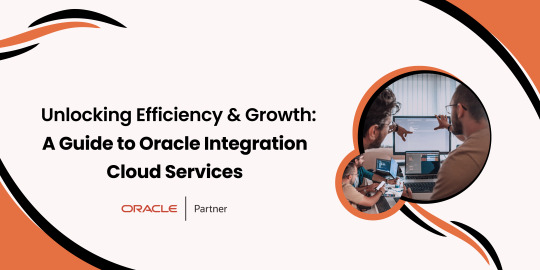
In today’s time, businesses are constantly seeking ways to optimize their operations and drive growth. One solution that has emerged as a game-changer is Oracle Integration Cloud Services (ICS). This comprehensive platform offers a wide range of tools and capabilities designed to streamline processes, integrate applications, and unlock efficiency across the organization. In this guide, we’ll delve into the intricacies of Oracle ICS, exploring its features, benefits, and how it can empower businesses to achieve their goals.
Understanding Oracle Integration Cloud Services
At its core, Oracle ICS is a cloud-based integration platform that enables seamless connectivity between various applications, systems, and data sources. Whether it’s connecting on-premises applications with cloud-based solutions or integrating disparate systems within the organization, Oracle ICS provides the flexibility and scalability needed to simplify complex integration challenges.
Key Features and Capabilities
Oracle ICS offers a plethora of features and capabilities designed to streamline integration processes and drive efficiency. Some key highlights include:
1. Drag-and-Drop Integration:
With an intuitive drag-and-drop interface, users can easily create and configure integrations without the need for extensive coding or technical expertise.
2. Prebuilt Integrations:
Oracle ICS comes with a library of prebuilt integrations for popular applications and services, allowing businesses to quickly connect their systems and accelerate time to value.
3. Real-Time Monitoring:
The platform provides real-time monitoring and analytics capabilities, giving users visibility into the performance of their integrations and enabling proactive problem-solving.
4. Robust Security:
Oracle ICS prioritizes security and compliance, with built-in encryption, access controls, and data protection features to safeguard sensitive information.
Benefits of Oracle Integration Cloud Services
The adoption of Oracle ICS offers numerous benefits for businesses looking to optimize their operations and drive growth:
1. Improved Efficiency:
By streamlining integration processes and automating repetitive tasks, Oracle ICS helps businesses reduce manual effort and increase productivity.
2. Enhanced Agility:
With its flexible architecture and scalability, Oracle ICS enables businesses to adapt quickly to changing market conditions and customer demands.
3. Cost Savings:
By eliminating the need for costly custom integrations and reducing reliance on IT resources, Oracle ICS helps businesses lower their overall integration costs.
4. Accelerated Innovation:
With faster time to market for new initiatives and the ability to quickly test and iterate on ideas, Oracle ICS empowers businesses to innovate and stay ahead of the competition.
Grey Space Computing: Your Partner in Efficiency and Growth
At Grey Space Computing, we recognize the critical importance of efficiency and growth in today’s business landscape. That’s why we’re thrilled to introduce you to Oracle Integration Cloud Services (ICS) – a transformative solution designed to revolutionize the way businesses operate. Serving as a cornerstone in our mission to empower businesses with cutting-edge technology solutions, Oracle ICS seamlessly integrates applications, systems, and data sources to streamline processes and drive efficiency across the organization.
We understand the complexities of modern integration challenges and are committed to simplifying the process for our clients. With Oracle ICS’s intuitive drag-and-drop interface and extensive library of prebuilt integrations, our clients can effortlessly connect their systems and accelerate time to value.
Furthermore, Oracle ICS’s real-time monitoring and analytics capabilities provide invaluable insights into integration performance, enabling proactive problem-solving and optimization. Security is a top priority, with Oracle ICS implementing robust measures to ensure sensitive information remains protected.
The benefits of Oracle ICS extend far beyond efficiency gains. By reducing manual effort, increasing productivity, and facilitating cost savings, businesses can achieve improved efficiency, enhanced agility, and accelerated innovation.
FAQs
What is Oracle Integration Cloud Services (ICS)?
Oracle ICS is a cloud-based integration platform that facilitates seamless connectivity between various applications, systems, and data sources.
What are the key features of Oracle Integration Cloud Services?
Oracle ICS offers drag-and-drop integration, prebuilt integrations, real-time monitoring, and robust security features.
How can Oracle ICS benefit my business?
Oracle ICS can improve efficiency, enhance agility, reduce costs, and accelerate innovation within your organization.
How does Grey Space Computing support businesses in implementing Oracle ICS?
Grey Space Computing provides comprehensive support and expertise to help businesses seamlessly implement and optimize Oracle ICS within their operations.
Conclusion:
Grey Space Computing is dedicated to helping businesses unlock efficiency and drive growth through Oracle Integration Cloud Services. With its comprehensive features, intuitive interface, and robust security, Oracle ICS provides the foundation for seamless integration and collaboration across the organization. Contact us today to learn how Grey Space Computing and Oracle ICS can propel your business forward.
#Oracle Integration Cloud Services benefits#How to use Oracle Integration Cloud#Oracle Cloud integration best practices#Oracle ICS for business growth#Streamlining processes with Oracle ICS#Oracle Integration Cloud for efficiency#Enhancing business operations with Oracle ICS#Oracle ICS real-time monitoring features#Cost savings with Oracle Integration Cloud#Oracle ICS for seamless application integration#Oracle ICS security and compliance features#Improving productivity with Oracle Cloud integration#Oracle Integration Cloud for digital transformation#Maximizing efficiency with Oracle ICS#Oracle ICS drag-and-drop integration
1 note
·
View note
Text
Overcoming Common Challenges in ERP Implementation for Manufacturing
In the dynamic and constantly changing environment of the industrial sector, enterprises must maintain flexibility and strive for competitiveness. Enterprise Resource Planning (ERP) software is a pivotal instrument that facilitates manufacturers in attaining their objectives. Enterprise Resource Planning (ERP) systems provide a broad range of integrated applications that are specifically developed to optimise operational processes, enhance productivity, and facilitate organisational expansion. Nevertheless, despite their considerable potential, ERP for manufacturing industry projects frequently encounter typical obstacles that can impede their achievement.
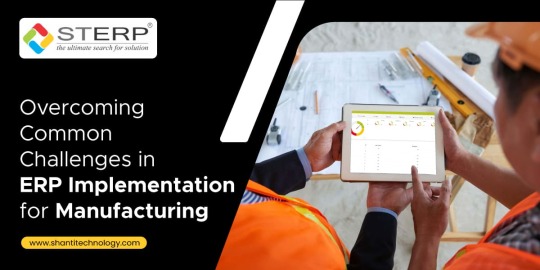
This blog post aims to examine the world of ERP for manufacturing industry, focusing on the most effective ERP solutions suitable for manufacturing enterprises of varying scales, encompassing both large-scale operations and small-scale organisations. Furthermore, we will explore the common challenges that manufacturers face during the adoption of the best ERP software for manufacturing companies and offer practical strategies for overcoming these difficulties.
The Power of ERP for Manufacturing:
Prior to delving into the complexities and remedies associated with the adoption of Enterprise Resource Planning (ERP), it is essential to comprehend the profound impact that ERP systems have on the manufacturing sector.
· ERP for Manufacturing Industry:
The manufacturing industry is characterised by intricate procedures, a wide range of product offerings, and complicated supply chain dynamics. Enterprise Resource Planning (ERP) demonstrates its exceptional capabilities in this context. Enterprise Resource Planning (ERP) systems for manufacturing encompass the integration of several operational tasks, such as production planning, inventory management, quality control, and finance management, under a unified and interconnected platform. The integration described herein provides manufacturers with the capability to access real-time visibility into their operations, hence facilitating data-driven decision-making and improving overall efficiency.
· Best ERP for Manufacturing Industry:
When it comes to the selection of ERP software for the manufacturing industry, it is imperative to carefully evaluate a system that is in line with the unique requirements of the organisation. Prominent enterprise resource planning (ERP) solutions catering to the manufacturing industry encompass SAP S/4HANA, Oracle ERP Cloud, Microsoft Dynamics 365, and STERP by Shanti Technology. These solutions provide comprehensive functionalities specifically designed for manufacturing processes, enabling organisations to enhance production efficiency, minimise expenses, and enhance overall profitability.
· ERP for Small Manufacturing Businesses:
Enterprise Resource Planning (ERP) systems are not exclusively designed for huge organisations but can also be beneficial for small manufacturing businesses. ERP systems can provide significant advantages to small manufacturing enterprises as well. Indeed, the implementation of an appropriate Enterprise Resource Planning (ERP) solution can effectively equalise the competitive landscape for small-scale firms, equipping them with the necessary resources to compete efficiently. Scalable choices, such as Shanti Technology's STERP, present themselves as suitable solutions for small enterprises seeking expansion opportunities.
Challenges in ERP Implementation for Manufacturing:
Although the potential benefits of Enterprise Resource Planning (ERP) are alluring, the process of deploying such systems might be perceived as a formidable endeavour accompanied by several obstacles. Manufacturers frequently encounter several challenges in their operations.
· Resistance to Change:
Resistance to change is a prominent obstacle encountered with the adoption of Enterprise Resource Planning (ERP) systems. There may exist a certain degree of resistance among employees who have become accustomed to utilising legacy systems over an extended period of time, hence exhibiting hesitancy towards embracing novel technological advancements. In order to surmount this problem, it is imperative to engage employees from the inception, effectively communicate the advantages of Enterprise Resource Planning (ERP), and offer thorough training and assistance.
· Data Migration:
The process of data migration is often characterised by its complexity and time-intensive nature. The process of migrating data from outdated legacy systems to a modern Enterprise Resource Planning (ERP) system has the potential to result in errors and compromise the integrity of the transferred data. The rigorous planning, validation of data accuracy, and implementation of a comprehensive data migration strategy are crucial.
· Integration Issues:
The effectiveness of ERP systems relies on their ability to smoothly integrate with other software and systems utilised inside the organisation. The integration process may encounter difficulties when preexisting systems lack compatibility with the newly implemented Enterprise Resource Planning (ERP) system. Conducting a comprehensive compatibility study and making necessary investments in middleware are critical measures to ensure seamless integration.
· Budget Overruns:
Budget overruns are a common occurrence in Enterprise Resource Planning (ERP) implementations, mostly attributed to unanticipated expenditures such as customisation, supplementary training, or prolonged project schedules. In order to address the issue of budget overruns, it is advisable to develop a comprehensive budget plan, including provisions for unforeseen circumstances, and maintain vigilant oversight of expenditures during the execution phase.
Overcoming ERP Implementation Challenges:
· Change Management:
In order to mitigate resistance towards change, it is imperative to involve employees at an early stage of the process. Organise seminars, facilitate training sessions and effectively articulate the advantages of the Enterprise Resource Planning (ERP) system. Promote the solicitation of feedback and implement necessary modifications in accordance with user input. Resistance to the implementation of the best ERP software for manufacturing company tends to decrease when employees perceive the system's usefulness and receive enough support during the transition process.
· Data Migration Strategy:
The effectiveness of data migration is contingent upon thorough planning and precise implementation. Establish a data migration team tasked with the responsibilities of data cleansing, validation, and mapping. It is advisable to conduct testing of data migration procedures inside a controlled setting prior to executing the implementation on a larger scale. It is imperative to consistently perform data backups in order to safeguard data integrity throughout the transfer process.
· Integration Expertise:
In order to address integration difficulties, it is advisable to engage in collaboration with ERP suppliers and IT professionals who possess specialised knowledge and skills in the field of integration. These individuals possess the ability to identify possible challenges related to integration and devise appropriate strategies to address them. It is advisable to explore the option of investing in middleware or connectors that can effectively facilitate the integration process between the Enterprise Resource Planning (ERP) system and the pre-existing systems.
· Budget Management:
In order to mitigate the occurrence of budget overruns, it is advisable to design a budget that is grounded in realism and includes a contingency fund. It is advisable to conduct periodic evaluations of expenditures and make necessary modifications to the budget accordingly. It is advisable to give precedence to fundamental customization and supplementary components while postponing non-essential functionalities to subsequent stages of the implementation process. The implementation of a staged approach can effectively manage expenses while also guaranteeing the establishment of essential functionality.
Leveraging STERP for Manufacturing Company:
In the context of addressing the obstacles encountered during ERP adoption, it is vital to underscore the potential value that Shanti Technology's STERP solution holds for manufacturers.
· STERP's Manufacturing Expertise:
The manufacturing expertise of STERP is highly regarded as it is an ERP solution that has been specifically tailored to meet the needs of the manufacturing industry. The software provides a variety of functionalities specifically designed for manufacturing operations, including but not limited to demand prediction, production scheduling, and quality management. The industry-specific experience of STERP facilitates the deployment process and guarantees a seamless alignment between your ERP system and your manufacturing requirements.
· Scalability for Small Manufacturers:
Scalability is a crucial aspect for small manufacturers, and it has been observed that the Small Manufacturer Enterprise Resource Planning (STERP) system offers a viable solution in this regard. As an enterprise expands, the Scalable Technology and Enterprise Resource Planning (STERP) system may effectively meet the increasing requirements, so serving as a favourable option for organisations seeking efficient scalability without the necessity of investing in a new Enterprise Resource Planning (ERP) system in the future.
· Comprehensive Training and Support:
STERP provides a comprehensive training and support programme aimed at facilitating a seamless changeover process. STERP offers a comprehensive range of services, including on-site training sessions and round-the-clock customer support, to ensure that your staff is adequately equipped to maximise the efficiency and effectiveness of the ERP system.
Final Thoughts:
The deployment of Enterprise Resource Planning (ERP) systems in the manufacturing business presents several difficulties. However, by employing appropriate techniques and utilising the best ERP software for manufacturing companies, developed by STERP (Shanti Technology), these issues can be effectively addressed. Manufacturers can optimise the utilisation of ERP systems by effectively handling resistance to change, methodically preparing data migration, managing integration processes efficiently, and maintaining strict adherence to budgetary considerations.
It is important to acknowledge that the adoption of Enterprise Resource Planning (ERP) systems should not be viewed as a singular occurrence, but rather as a continuous endeavour aimed at achieving optimal performance. It is imperative to consistently evaluate the performance of your Enterprise Resource Planning (ERP) system, solicit input from users, and remain abreast of prevailing industry standards in order to ascertain that your ERP system is capable of efficiently supporting your manufacturing activities.
The STERP system represents an optimal enterprise resource planning (ERP) solution specifically designed for the manufacturing sector. It provides customised functionalities, scalability, and comprehensive assistance to enable firms to excel in a highly competitive market. Manufacturers can achieve operational streamlining, enhanced efficiency, and long-term success in the ever-changing industrial landscape by making informed decisions on the selection of an appropriate Enterprise Resource Planning (ERP) solution according to established implementation best practices.
#ERP for manufacturing industry#Best ERP for manufacturing industry#ERP for small manufacturing business#Best ERP software for manufacturing#Manufacturing software for small business#Best ERP for small manufacturing business#ERP software for manufacturing industry#ERP for manufacturing company
7 notes
·
View notes
Text
Exploring the Significance of ERP Software: How It Works, Why It's Vital for Companies, and the Benefits for Your Business
Enterprise Resource Planning (ERP) software stands as the backbone of modern businesses, planning a masterpiece of operations seamlessly. This comprehensive suite of integrated applications manages core business processes, including finance, HR, inventory, supply chain, and more. Its significance lies in its ability to streamline operations, enhance efficiency, and foster data-driven decision-making.
Cloud-based ERP solutions offer a versatile edge over traditional on-premises systems. They facilitate real-time data accessibility, scalability, and cost-effectiveness. Conversely, on-premises ERP software provides robust security and customization options, ideal for businesses with specific compliance needs or intricate operational structures.
Adopting the best ERP Software Consulting Solutions is a strategic move for companies, as it centralizes disparate processes into a unified platform, eradicates data silos, and enhances collaboration, thereby boosting productivity and offering a comprehensive view of the business for smarter, data-backed decisions."
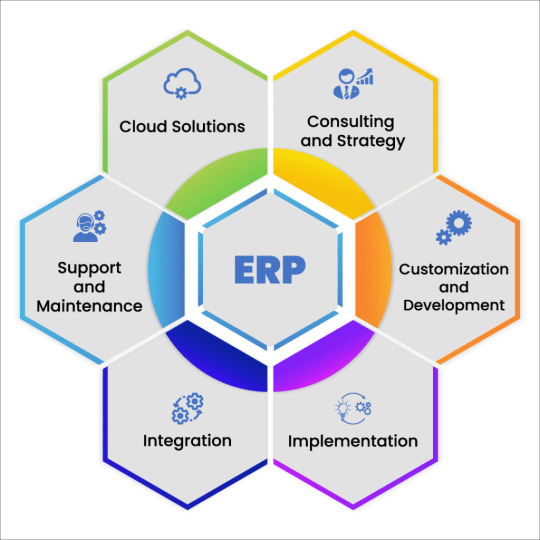
The benefits of ERP software for your business are multifaceted. It optimizes resource utilization, streamlines workflows, minimizes errors, and accelerates reporting cycles. This ultimately results in improved customer satisfaction, reduced operational costs, and better agility in responding to market changes.
When seeking the best ERP software development services, solutions, implementation, or consulting, businesses must prioritize expertise, reliability, and compatibility. The best ERP software development services and solutions cater to unique business needs, offering tailor-made solutions for seamless integration and functionality.
Choosing the best ERP software implementation services or solutions involves a thorough evaluation of the provider's track record, customer reviews, and adaptability to your company's requirements. Expert ERP software consulting services navigate businesses through the maze of choices, ensuring optimal software selection, implementation, and long-term success.
In conclusion, the strategic implementation of ERP software can revolutionize business operations, driving efficiency, innovation, and competitiveness. Selecting the best ERP software development, implementation, and consulting services is pivotal for maximizing the benefits and leveraging the full potential of this transformative technology.
ERP Offerings & Practice's
SAP/S4 HANA ERP Software Solutions
Ellucian Banner ERP Software Solutions
Peoplesoft ERP Software services
Oracle Cloud ERP Software services
UKG ERP Software services
Salesforce ERP Software services
3 notes
·
View notes
Text
Sap Foundation Coaching & Certification Course Uplatz
Global Knowledge is an now an Authorised SAP Training associate offering the full range of official SAP training courses including classroom, Virtual and self-paced training. Get the schooling you want on the newest SAP technologies together with S4/HANA in at present's cloud infrastructure panorama. Our training is delivered by SAP trainers, using official materials written by their skilled developers on the most recent software program releases. All of SAP's public schedule and Self-Paced coaching is now obtainable via Global Knowledge. Sulekha is India's best and inexpensive premier listing service.
youtube
In case one thing is wrong, an administrator would want to be able to interactively log on to the system. Update work processes truly manipulate the database, so they'd be higher served to be on the precise database server. They make all the adjustments to the database throughout the R/3 system. Each app server has only one dispatcher as a outcome of it might get type of difficult for two dispatchers to route requests to the work processes.
sap security course london , CRM, SRM, SCM, BI.PI, EP, and SAP Solution Manager are only a few of the modules that this SAP BASIS Training curriculum coordinates. However, to fully comprehend SAP’s base module, we must have an intensive understanding of data and system backend expertise. The freedom to make use of any working system and database management system.
What Are The Benefits Of Training From Sap?
SAP options are being utilized by all industries and repair sectors throughout the world to improve buyer connections and enhance efficiency in supply chains and company operations. SAP Certification is, in the end, a long-term investment in future professional success. Certification, significantly for inexperienced persons, is definitely not a practical answer and will not result in quick results. People with certification who can demonstrate appreciable understanding and experience have a far better chance of acquiring the SAP job they’ve all the time desired in today’s severe ambiance. Aarav Goel has top education trade knowledge with 4 years of experience.
After completing certainly one of these coaching course you might be able to enhance your future profession prospects within the SAP subject and even cross a certification.
People with certification who can show considerable understanding and experience have a far better probability of buying the SAP job they’ve at all times desired in today’s critical atmosphere.
Before studying what SAP certification is all about, it is important to know the software program with which this technology works with Enterprise Resource Planning .
This course introduces SAP HANA. Through lectures and workouts you'll rapidly develop a broad understanding of all key areas of SAP HANA including technology, architecture, information modeling, data administration and application development.
SAP BASISis the spine of SAP ERP system and helps to run and administer SAP software program in an efficient method. SAP BASIS training is mainly focused at these individuals who need to begin a career of an SAP BASIS administrator. SAP BASIS training courses are normally targeted on topics which are related to installation, technical configuration and upkeep of SAP software program. They train in regards to the technical and very low-level side of operating SAP business functions. SAP BASIS training covers topics associated to integration of SAP software and varied database methods (Oracle, MS SQL, HANA, etc.). It also considers the features of monitoring SAP techniques, managing SAP landscapes and administration of user accounts and roles in SAP.
It offers with operations similar to day to day planning, logistics, reporting, finances and HR. Crystal Reports is the last word enterprise intelligence application. This course introduces SAP HANA. Through lectures and workout routines you'll quickly develop a broad understanding of all key areas of SAP HANA together with technology, structure, data modeling, knowledge management and utility improvement.
Accelerate Productiveness And Performance With Customised Training From Sap
Document transactions occurring inside these modules generate account postings via account dedication tables. Reports of this Modules are consumer for external function corresponding to Balance sheet and Profit and Loss of each financial 12 months. Now to have the flexibility to guarantee working of these layers, the SAP Basis Administrator has to be educated about several Operating Systems. He or she should also bear in mind concerning the working of databases similar to Oracle and SQL Server. Client exports and imports happens when you wish to take a shopper from one system and move it to another.

With this certification, you’ll be able to apply this information as a solution consultant in a team setting. ✅ Yes, we are going to provide entry to all the learning supplies after the entire payment for the course. Study method describes the format by which the course will be delivered. At Reed Courses, courses are delivered in a variety of ways, together with on-line programs, where the course content may be accessed on-line remotely, and classroom courses, the place programs are delivered in individual at a classroom venue. Our instructors are extremely expert with business experience of many years, working in finest and renowned organization.
Launch your global profession after successful completion of the SAP certification and start applying for jobs instantly. Before learning what SAP certification is all about, you will want to know the software program with which this know-how works with Enterprise Resource Planning . ERP is the standard software utilized by majority of companies to automate duties. In latest times, SAP courses have gained large appreciation amongst younger students and IT professionals. A certification on this program supplies a big enhance to one’s profession. For these seeking to know more about what's SAP certification course, period , eligibility and fee construction, all the important details are collated collectively for you to get an thought about this popular course.
#sap p2p training uk#sap p2p course uk#sap p2p training london#sap p2p course london#sap p2p online training uk#sap p2p online training london#sap p2p online course london#sap p2p online course uk
2 notes
·
View notes
Text
Carving Out Success with AvenDATA
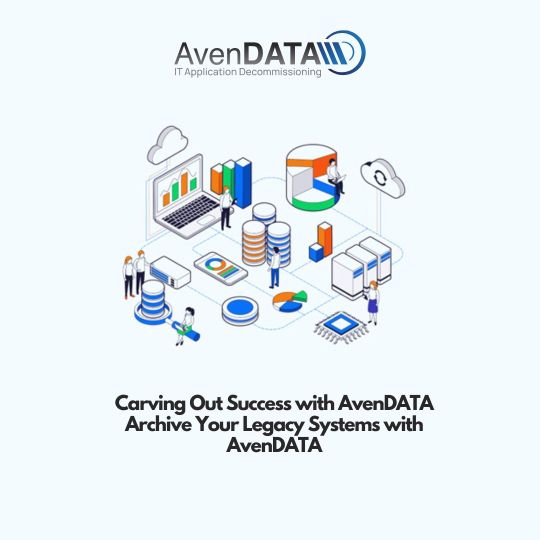
Archive Your Legacy Systems with AvenDATA
In recent years, many companies have looked to carve out non-core business units to focus on their primary strengths, reduce debt, and improve earnings. However, the carve-out process is far from simple—it’s filled with risks and complexities. Success in this endeavor hinges on choosing the right solution provider.
AvenDATA excels in this area. We understand the intricacies of carving out company codes and offer expert support in designing, planning, and implementing carve-outs.
Why Choose AvenDATA?
Expertise and Experience: Carve-outs require a deep understanding of database structures and ERP systems like SAP, Oracle, and Navision. Our team possesses the necessary skills and experience to handle these tasks efficiently.
Comprehensive Solutions: We provide a complete solution for separating clients and accounting areas within the ViewBox, which helps avoid legal conflicts over data provision before sales. Our ViewBox can be deployed on-premises or as a secure cloud solution.
Structured Approach: We follow a systematic process to separate elements effectively and efficiently, whether due to company sales, acquisitions, or restructuring (such as S/4 HANA implementations). We adhere to strict timelines to comply with contractual regulations.
Tackling Challenges Head-On
The complexity of carve-outs often arises when acquiring or selling a company. Transferring data between IT systems is fraught with challenges, from asset management and cost forecasting to creating financial statements and handling legalities.
Addressing Employee Concerns: Transitioning employees who are familiar with existing systems can be tricky, as they might feel marginalized. Our solutions are designed to ease this transition with high professional and technical understanding.
Managing Complex Operations: With factors like asset management, legal and tax issues, and financial advisory, carve-outs can be risky. AvenDATA’s specialized archiving solutions mitigate these risks, ensuring a smooth and effective process.
Our Proven Process
We approach carve-outs with meticulous planning and execution:
Detailed Analysis: We start by analyzing systems and data streams to develop a concept that differentiates IT resources between infrastructure and applications.
Thorough Checklists: Our checklists identify dependencies between IT tasks and overall requirements, ensuring a successful data separation.
Best Practices: Our team follows best practices, leveraging our deep understanding of databases to build a thorough strategy and carefully consider deployment options.
Commitment to Success
AvenDATA is dedicated to effective communication and active participation with your IT team. We propose and follow appropriate methods to ensure balanced knowledge dissemination and project success. Our extensive experience in data migration, security management, and data integration makes us the ideal partner for your carve-out needs.
With AvenDATA, you can confidently navigate the complexities of carving out non-core business units and focus on what you do best. Let us help you archive your legacy systems and carve out a path to success.
0 notes
Text
Future Trends in Oracle Decommissioning: What to Expect in the Next Decade
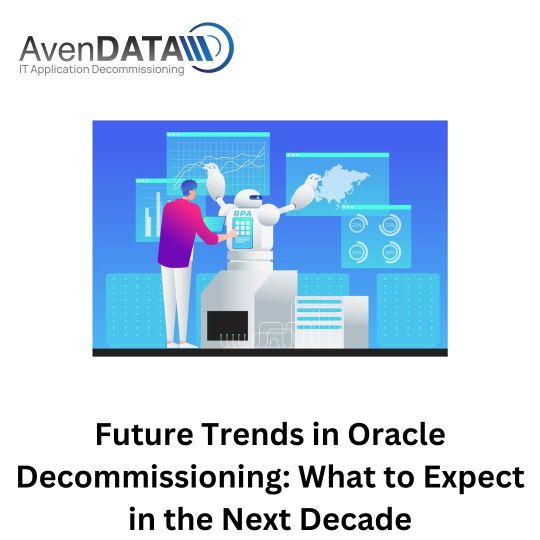
As businesses continue to evolve in the digital age, the decommissioning of legacy systems, including Oracle databases, is becoming an essential part of IT strategy. Over the next decade, the landscape of Oracle Decommissioning is expected to undergo significant changes driven by technological advancements, regulatory requirements, and evolving business needs. In this blog, we will explore the future trends in Oracle Decommissioning and what organizations can expect as they navigate this critical process.
Increased Adoption of Cloud Solutions
One of the most prominent trends in Oracle Decommissioning is the shift towards cloud-based solutions. As organizations seek to reduce costs, increase scalability, and enhance flexibility, migrating data and applications from on-premises Oracle systems to the cloud is becoming increasingly attractive. Cloud providers offer robust tools and services that simplify the decommissioning process, ensuring data integrity and security while minimizing downtime.
Automation and AI-Driven Processes
Automation and artificial intelligence (AI) are set to revolutionize Oracle Decommissioning. Automated tools can handle repetitive tasks, such as data migration and system validation, with greater accuracy and speed than manual processes. AI-driven analytics can help identify potential issues, optimize workflows, and predict outcomes, enabling more efficient and effective decommissioning projects. This trend will lead to reduced human error and lower operational costs.
Enhanced Data Governance and Compliance
With increasing regulatory scrutiny and the growing importance of data privacy, enhanced data governance will play a crucial role in Oracle Decommissioning. Future decommissioning projects will need to ensure compliance with regulations such as GDPR, CCPA, and other data protection laws. This will involve implementing stringent data retention policies, secure data destruction methods, and comprehensive audit trails to demonstrate compliance and protect sensitive information.
Focus on Sustainability and Green IT
Environmental concerns are becoming a priority for businesses worldwide, and IT departments are no exception. Future Oracle Decommissioning efforts will emphasize sustainability and green IT practices. This includes recycling and repurposing hardware components, reducing electronic waste, and leveraging energy-efficient data centers. Organizations will seek to minimize their carbon footprint by adopting eco-friendly decommissioning strategies.
Increased Collaboration and Integration
As Oracle Decommissioning projects become more complex, collaboration between different stakeholders will be essential. IT departments will need to work closely with business units, compliance teams, and third-party vendors to ensure a seamless transition. Integration of various systems and applications will be crucial to maintaining business continuity and avoiding disruptions. Collaborative platforms and project management tools will facilitate better communication and coordination throughout the decommissioning process.
Emergence of Specialized Decommissioning Services
The growing complexity of Oracle Decommissioning will give rise to specialized service providers. These experts will offer end-to-end decommissioning solutions, from initial assessment and planning to execution and post-decommissioning support. By leveraging their expertise and industry best practices, organizations can streamline the decommissioning process, mitigate risks, and achieve better outcomes.
Shift Towards Hybrid IT Environments
The future of Oracle Decommissioning will see a shift towards hybrid IT environments, where on-premises systems coexist with cloud-based solutions. This approach allows organizations to retain control over critical applications while benefiting from the scalability and cost-efficiency of the cloud. Decommissioning projects will need to account for this hybrid model, ensuring seamless integration and data flow between different environments.
Proactive Legacy System Management
Proactive management of legacy systems will become a key trend in Oracle Decommissioning. Rather than waiting for systems to become obsolete or problematic, organizations will adopt a proactive approach to decommissioning. This involves regular assessments of system performance, identifying potential risks, and planning decommissioning projects well in advance. Proactive management ensures smoother transitions and reduces the likelihood of unexpected issues.
Advanced Security Measures
As cyber threats continue to evolve, advanced security measures will be a critical component of Oracle Decommissioning. Future decommissioning projects will prioritize data security at every stage, from migration to destruction. This includes implementing robust encryption, multi-factor authentication, and secure data transfer protocols. Ensuring the security of sensitive information will be paramount to protecting organizational assets and maintaining customer trust.
Continuous Improvement and Learning
The dynamic nature of technology means that Oracle Decommissioning practices will continue to evolve. Organizations will embrace a culture of continuous improvement and learning, regularly updating their decommissioning strategies based on new insights and technological advancements. This iterative approach will enable businesses to stay ahead of the curve, optimize their decommissioning processes, and achieve better outcomes over time.
Conclusion
The future of Oracle Decommissioning is poised for significant transformation, driven by technological advancements, regulatory requirements, and evolving business needs. By embracing these trends, organizations can navigate the complexities of decommissioning, ensuring a smooth transition from legacy systems to modern IT environments. As we look ahead to the next decade, it is clear that proactive management, strategic planning, and a commitment to innovation will be key to successful Oracle Decommissioning projects.
0 notes
Text
What are the top 10 certifications to excel in business intelligence?

Achieving certifications in business intelligence (BI) can significantly enhance your skills and credibility in the field, opening up new career opportunities and validating your expertise to employers. Here are the top 10 certifications to excel in business intelligence:
1. Certified Business Intelligence Professional (CBIP)
Provider: Data Warehousing Institute (TDWI)
Key Features:
Comprehensive certification covering various BI disciplines, including data integration, analytics, and data management
Validates expertise in BI concepts, methodologies, and best practices
Consists of multiple levels (Foundation, Practitioner, Master) to accommodate different skill levels and career stages
2. Microsoft Certified: Azure Data Engineer Associate
Provider: Microsoft
Key Features:
Focuses on designing and implementing data solutions on the Microsoft Azure platform
Validates skills in data storage, data processing, and data visualization using Azure services like Azure SQL Database, Azure Data Factory, and Power BI
Demonstrates proficiency in building scalable and reliable BI solutions on cloud infrastructure
3. Tableau Desktop Specialist
Provider: Tableau
Key Features:
Entry-level certification focused on Tableau Desktop, a leading BI and data visualization tool
Validates proficiency in creating basic visualizations, organizing data, and sharing insights using Tableau Desktop
Ideal for beginners looking to establish foundational skills in data visualization and analysis
4. Qlik Sense Business Analyst Certification
Provider: Qlik
Key Features:
Designed for business analysts and data professionals using Qlik Sense, a popular BI and data analytics platform
Covers topics such as data modeling, visualization design, and data storytelling
Validates skills in leveraging Qlik Sense to analyze data, generate insights, and make data-driven decisions
5. IBM Certified Data Architect – Big Data
Provider: IBM
Key Features:
Focuses on designing and implementing big data solutions using IBM technologies such as IBM BigInsights and IBM Db2
Validates skills in data modeling, data architecture, and data integration in the context of big data environments
Demonstrates proficiency in leveraging IBM tools to solve complex data challenges
6. SAS Certified BI Content Developer
Provider: SAS
Key Features:
Designed for individuals developing BI content using SAS software, including SAS Visual Analytics and SAS Visual Statistics
Validates skills in data exploration, report building, and dashboard creation using SAS BI tools
Demonstrates proficiency in leveraging SAS software to deliver actionable insights and drive decision-making
7. Oracle Business Intelligence Foundation Suite 11g Certified Implementation Specialist
Provider: Oracle
Key Features:
Focuses on implementing and configuring Oracle Business Intelligence Enterprise Edition (OBIEE) solutions
Covers topics such as metadata modeling, report development, and dashboard design using OBIEE
Validates skills in deploying and managing BI solutions using Oracle technologies
8. MicroStrategy Certified Analyst
Provider: MicroStrategy
Key Features:
Designed for individuals analyzing data and building reports using MicroStrategy software
Validates skills in data exploration, dashboard creation, and advanced analytics using MicroStrategy tools
Demonstrates proficiency in leveraging MicroStrategy to derive insights and drive business outcomes
9. SAP Certified Application Associate – Business Intelligence with SAP BW 7.5 & SAP BI 4.3
Provider: SAP
Key Features:
Focuses on business intelligence concepts and tools within the SAP ecosystem, including SAP BW (Business Warehouse) and SAP BusinessObjects
Validates skills in data modeling, report creation, and data visualization using SAP BI tools
Demonstrates proficiency in leveraging SAP technologies to deliver actionable insights and support decision-making
10. Google Data Analytics Professional Certificate
Provider: Google (Coursera)
Key Features:
Entry-level certification covering foundational concepts in data analytics and BI
Consists of a series of courses covering topics such as data analysis, data visualization, and data cleaning using tools like SQL, Python, and Google Analytics
Ideal for beginners looking to kickstart their career in data analytics and business intelligence
Considerations for Choosing Certifications
Relevance to Career Goals: Choose certifications aligned with your career aspirations and areas of interest within the field of business intelligence.
Industry Recognition: Prioritize certifications that are widely recognized and valued by employers in the industry.
Skill Level: Consider your current skill level and experience when selecting certifications, opting for entry-level certifications for beginners and more advanced certifications for seasoned professionals.
Learning Format: Evaluate the learning format (e.g., self-paced online courses, instructor-led training) and duration of the certification programs to ensure they fit your learning preferences and schedule.
By earning certifications in business intelligence, you can demonstrate your expertise, stay competitive in the job market, and unlock new opportunities for career advancement in the dynamic field of data analytics and BI.
Read More Blogs:
Crypto Casinos Are Disrupting Traditional Online Games
Crypto Casino Investments: Assessing the Risks and Rewards
Top 5 New Crypto Coins with Potential to Soar in 2024
0 notes
Text
Dell Boomi Architect Resume

Crafting a Winning Dell Boomi Architect Resume
As a seasoned Dell Boomi Architect, your resume serves as the gateway to exciting new opportunities in cloud-based integration. In the competitive iPaaS (Integration Platform as a Service) landscape, a standout resume is essential to attract top recruiters and hiring managers. Let’s dive into how to make your resume shine.
Key Sections to Highlight
Summary Statement: This is your elevator pitch. Concisely communicate your years of experience as a Dell Boomi Architect, top skills (Boomi process building, API management, EDI, connectors), and relevant industry expertise.
Technical Skills: Showcase your Boomi mastery and other complementary technologies:
Dell Boomi: Emphasize your proficiency in Boomi Process Design, API Management, EDI, Master Data Hub, Flow, and AtomSphere concepts.
Web Services: REST, SOAP, XML, JSON
Connectors: Database connectors (SQL, Oracle, etc.), Application connectors (Salesforce, NetSuite, SAP, Workday, etc.), Technology connectors (FTP, SFTP, HTTP, etc.)
Programming Languages (if applicable): JavaScript, Java, Groovy
Cloud Platforms (optional): AWS, Azure, Google Cloud Platform
Professional Experience: List your roles in reverse chronological order. For each position:
Company Name, Location, Dates
Job Title: Dell Boomi Architect, Senior Integration Architect, etc.
Certifications: Demonstrate your commitment to continuous learning with Boomi certifications and any other relevant credentials.
Industry Expertise: Highlight experience in healthcare, finance, manufacturing, or logistics to tailor your resume for desired roles.
Tips to Power Up Your Resume
Action Verbs: Use strong action words like “designed,” “implemented,” “architected,” “optimized,” and “troubleshot.”
Keywords: Weave in industry-relevant keywords employers are likely to search for.
Metrics: Quantifiable achievements demonstrate your impact.
Tailoring: Customize your resume for each job application by aligning skills and achievements with the specific requirements.
Sample Resume Excerpt
Summary:
“Highly accomplished Dell Boomi Architect with 8+ years of experience architecting and delivering robust cloud integration solutions across healthcare, e-commerce, and supply chain domains. Proven track record in designing scalable Boomi solutions that drive efficiency and automation.”
Technical Skills:
Dell Boomi AtomSphere, Process Building, API Design & Management, EDI, SOAP, REST, JSON, XML, JavaScript, SaaS Connectors (Salesforce, NetSuite, Workday), Database Connectors (MySQL, SQL Server), AWS
Certifications:
Dell Boomi Professional Developer
AWS Certified Solutions Architect – Associate
Let’s Get Practical: Next Steps
Reflect: Analyze your past projects and quantify your achievements.
Build: Start drafting your resume, focusing on structure and keywords.
Tailor: Research target job postings and refine each version of your resume.
Proofread: Meticulously review for any errors.
With careful crafting and attention to detail, your Dell Boomi Architect resume will stand out and open exciting new doors!
youtube
You can find more information about Dell Boomi in this Dell Boomi Link
Conclusion:
Unogeeks is the No.1 IT Training Institute for Dell Boomi Training. Anyone Disagree? Please drop in a comment
You can check out our other latest blogs on Dell Boomi here – Dell Boomi Blogs
You can check out our Best In Class Dell Boomi Details here – Dell Boomi Training
Follow & Connect with us:
———————————-
For Training inquiries:
Call/Whatsapp: +91 73960 33555
Mail us at: [email protected]
Our Website ➜ https://unogeeks.com
Follow us:
Instagram: https://www.instagram.com/unogeeks
Facebook: https://www.facebook.com/UnogeeksSoftwareTrainingInstitute
Twitter: https://twitter.com/unogeek
0 notes
Text
Boomi Advantages

Title: The Power of Boomi: Why This Integration Platform is a Game-Changer
Introduction
In today’s complex technological landscape, businesses of all sizes need a seamless way to connect disparate applications, data sources, and systems. That’s where Boomi, a leading cloud-native integration platform, shines. With its intuitive interface, extensive capabilities, and scalability, Boomi offers numerous advantages that streamline business processes and accelerate digital transformation. Let’s explore the key benefits that make Boomi stand out.
Key Advantages of Boomi
Rapid and Simplified Integration: Boomi’s low-code, drag-and-drop interface empowers seasoned developers and less technical users to build integrations quickly and easily. Its vast library of pre-built connectors eliminates the need for complex hand-coding, making it significantly faster to connect applications and systems.
Hybrid Connectivity: Boomi excels in hybrid environments. Whether your applications and data reside on-premises, in the cloud, or combined, Boomi provides a unified platform to bridge the gaps and ensure seamless communication across your entire technology stack.
Robust Data Management: Boomi’s powerful data mapping and transformation tools help you shape data into the correct formats for different applications. This ensures data consistency and integrity throughout your workflows, minimizing errors and improving decision-making.
Enhanced Scalability: As your business needs to evolve and expand, Boomi scales with you. Its cloud-native architecture lets you easily adjust resources to accommodate increasing data volumes and integration demand without disrupting operations.
Heightened Security: Boomi takes security seriously. It adheres to stringent security standards and protocols to protect sensitive data at all stages of integration. With features like role-based access control and data encryption, you can be confident that your information is safe.
Community-Driven Innovation: Boomi boasts a strong user community that actively shares knowledge, best practices, and pre-built integration components. This collaborative environment fosters innovation, allowing you to tap into a wealth of resources to accelerate your integration projects.
Why Choose Boomi?
Boomi’s advantages translate into numerous benefits for organizations:
Improved Operational Efficiency: By automating data movement and streamlining business processes across systems, Boomi eliminates manual tasks and reduces errors, leading to significant time and cost savings.
Increased Agility: Boomi’s fast and flexible integration capabilities empower businesses to respond quickly to changing market conditions, customer demands, or new technology updates.
Enhanced Data Visibility: With Boomi, you gain a centralized view of your data flowing across systems, providing valuable insights into business operations and enabling informed decision-making.
Accelerated Time-to-Value: Boomi’s user-friendly interface and pre-built components speed up implementation time, enabling you to realize business benefits from your integration projects quickly.
Conclusion
If you seek a reliable, scalable, and easy-to-use integration platform to optimize your technology landscape, Boomi is a compelling choice. Its numerous advantages help businesses boost efficiency, adapt with agility, improve data-driven decision-making, and accelerate digital transformation.
Oracle Boomi
youtube
You can find more information about Dell Boomi in this Dell Boomi Link
Conclusion:
Unogeeks is the No.1 IT Training Institute for Dell Boomi Training. Anyone Disagree? Please drop in a comment
You can check out our other latest blogs on Dell Boomi here – Dell Boomi Blogs
You can check out our Best In Class Dell Boomi Details here – Dell Boomi Training
Follow & Connect with us:
———————————-
For Training inquiries:
Call/Whatsapp: +91 73960 33555
Mail us at: [email protected]
Our Website ➜ https://unogeeks.com
Follow us:
Instagram: https://www.instagram.com/unogeeks
Facebook: https://www.facebook.com/UnogeeksSoftwareTrainingInstitute
Twitter: https://twitter.com/unogeek
0 notes
Text
Unleashing the Power of Oracle Cloud ERP Software Services
In today's rapidly evolving business landscape, organizations need agile and scalable solutions to streamline their operations, drive growth, and stay ahead of the competition. Enter Oracle Cloud ERP Software Services – a game-changing platform that empowers businesses to modernize their finance, HR, procurement, and supply chain processes with agility and efficiency. In this comprehensive guide, we'll explore the key features, benefits, and best practices associated with Oracle Cloud ERP Software Services, and how organizations can leverage them to unlock their full potential.
Understanding Oracle Cloud ERP Software Services
Oracle Cloud ERP (Enterprise Resource Planning) Software Services encompass a suite of integrated applications that enable organizations to automate and optimize their core business processes. From financial management and human capital management to procurement and supply chain management, Oracle Cloud ERP Software Services cover all aspects of enterprise resource planning in the cloud.
At Kastech, we specialize in delivering Oracle Cloud ERP Software Services that help organizations achieve operational excellence, drive innovation, and accelerate growth. With our deep expertise in Oracle Cloud technology and proven track record of successful implementations, we empower our clients to leverage the full potential of Oracle Cloud ERP to transform their businesses.
Key Components of Oracle Cloud ERP Software Services
1. Financial Management
Oracle Cloud ERP Software Services include robust financial management capabilities that enable organizations to streamline their accounting, reporting, and financial planning processes. From general ledger and accounts payable to revenue management and budgeting, Oracle Cloud ERP provides real-time visibility into financial performance and compliance.
2. Human Capital Management (HCM)
Oracle Cloud ERP Software Services also include comprehensive human capital management solutions that help organizations manage their workforce effectively. From recruitment and onboarding to performance management and workforce planning, Oracle Cloud HCM empowers HR teams to attract, develop, and retain top talent.
3. Procurement
Oracle Cloud ERP Software Services offer end-to-end procurement solutions that streamline the procurement process, reduce costs, and mitigate risks. With features such as supplier management, sourcing, and contract management, Oracle Cloud Procurement enables organizations to optimize their procurement operations and drive strategic sourcing initiatives.
4. Supply Chain Management (SCM)
Oracle Cloud ERP Software Services also include advanced supply chain management capabilities that help organizations optimize their supply chain processes and improve efficiency. From demand planning and inventory management to order fulfillment and logistics, Oracle Cloud SCM provides real-time visibility and control over the entire supply chain.
Benefits of Oracle Cloud ERP Software Services
1. Scalability and Flexibility
Oracle Cloud ERP Software Services offer unmatched scalability and flexibility, allowing organizations to adapt and grow with ease. Whether you're a small business or a large enterprise, Oracle Cloud ERP can scale to meet your evolving needs and requirements.
2. Cost Savings
By moving to the cloud, organizations can realize significant cost savings compared to traditional on-premises ERP systems. With Oracle Cloud ERP Software Services, organizations can reduce IT infrastructure costs, eliminate upfront capital expenses, and benefit from a pay-as-you-go pricing model.
3. Enhanced Security and Compliance
Oracle Cloud ERP Software Services offer robust security features and compliance controls to protect sensitive data and ensure regulatory compliance. With features such as data encryption, access controls, and audit trails, Oracle Cloud ERP helps organizations mitigate security risks and maintain data integrity.
4. Accelerated Innovation
With Oracle Cloud ERP Software Services, organizations can leverage the latest innovations in cloud technology to drive business growth and innovation. From AI and machine learning to IoT and blockchain, Oracle Cloud ERP enables organizations to stay ahead of the curve and capitalize on emerging trends.
0 notes
Text
Oracle Apex e commerce Application
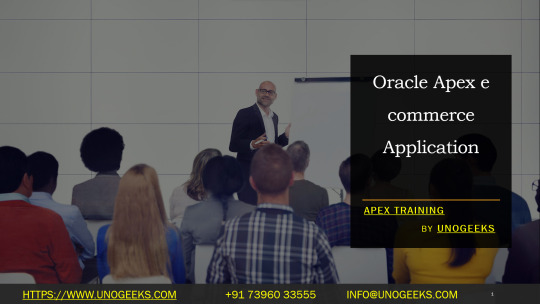
Building a Powerful E-Commerce Application with Oracle APEX
Oracle APEX (Application Express) is a fantastic platform for building scalable, enterprise-grade web applications. Its low-code approach accelerates development, allowing you to bring your e-commerce vision to life quickly and efficiently. In this blog, we’ll guide you through the key steps of creating an e-commerce application using Oracle APEX.
Understanding the Fundamentals
Before we dive into code, let’s outline the essential components of an e-commerce application:
Product Catalog: A well-structured database for storing product information (name, description, images, price, inventory).
Shopping Cart: A mechanism to allow users to add/remove items and manage their potential purchases.
Checkout Process: Secure form for gathering billing, shipping information, and processing payments.
Order Management: A system for tracking order status, inventory updates, and generating invoices.
Customer Accounts (Optional): Offer login capabilities for customers to view order history and manage addresses.
Setting Up the Environment
Oracle APEX shines, because it’s often readily available within Oracle Database environments. Here’s what you’ll need:
Oracle Database: Choose either a cloud-based solution (like Autonomous Database) or an on-premises installation.
Oracle APEX Workspace: Access your Oracle APEX environment or create a new workspace.
Designing the Data Model
A robust data model forms the foundation of your application. Consider these tables:
PRODUCTS: Stores product details
CUSTOMERS: (If offering accounts) Stores customer information
ORDERS: Captures order data
ORDER_ITEMS: Links individual products to orders
CATEGORIES (Optional): To organize your products
Creating the User Interface with APEX
Oracle APEX provides a user-friendly interface to build your e-commerce storefront:
Product Listing Page: Use Interactive Reports or Cards to display your products compellingly. Enable search and filtering.
Product Details Page: Showcase in-depth product information, image galleries, and the “Add to Cart” button.
Shopping Cart Page: Allow users to review contents, adjust quantities, and proceed to checkout.
Checkout Pages: Create forms for collecting customer and payment information. Integrate with a payment gateway.
Order Confirmation: Display order summaries and provide tracking details.
Logic and Functionality
APEX uses PL/SQL to add business logic and dynamic behavior:
Shopping Cart Management: Code to add products to cart, calculate totals, and manage session data for the cart.
Payment Gateway Integration: Connect with your chosen payment provider (e.g., Stripe, PayPal).
Order Processing: Handle inventory adjustments, generate order confirmations, and send notifications.
Security: Implement robust security measures to protect sensitive customer data.
Additional Considerations
Responsive Design: Use APEX themes or custom CSS to ensure your app works seamlessly across devices.
Search Engine Optimization: Implement SEO best practices for product pages to increase visibility.
Shipping and Tax calculations: Account for real-time shipping rates and tax rules.
The Power of APEX
Oracle APEX empowers you with:
Rapid Development: Build your e-commerce application far faster than with traditional coding methods.
Scalability: APEX applications can handle high traffic volume.
Customization: Easily tailor the application to suit your unique business needs.
Security: Database-level security features come built-in.
Start Building
Whether you’re a seasoned developer or new to APEX, its intuitive tools make creating an e-commerce application achievable. Use Oracle’s excellent documentation and online workshops to further develop your skills.
youtube
You can find more information about Oracle Apex in this Oracle Apex Link
Conclusion:
Unogeeks is the No.1 IT Training Institute for Oracle Apex Training. Anyone Disagree? Please drop in a comment
You can check out our other latest blogs on Oracle Apex here – Oarcle Apex Blogs
You can check out our Best In Class Oracle Apex Details here – Oracle Apex Training
Follow & Connect with us:
———————————-
For Training inquiries:
Call/Whatsapp: +91 73960 33555
Mail us at: [email protected]
Our Website ➜ https://unogeeks.com
Follow us:
Instagram: https://www.instagram.com/unogeeks
Facebook: https://www.facebook.com/UnogeeksSoftwareTrainingInstitute
Twitter: https://twitter.com/unogeeks
0 notes
Text
ORACLE APEX ONLINE

Oracle APEX: Build Powerful Web Apps Online, No Coding Expertise Required
Oracle Application Express (APEX) is transforming the way we build web applications. This powerful low-code development platform, included with Oracle Database, offers a completely browser-based experience, empowering you to create sophisticated, data-driven apps with minimal coding knowledge.
What Makes APEX Special
Cloud-Ready: APEX is perfect for online deployment. Whether you host your Oracle Database in the cloud or on-premises, APEX seamlessly integrates and can be accessed anywhere with a web browser.
Intuitive Development: The visual, drag-and-drop interface of APEX simplifies the construction of user interfaces and application logic. You’ll spend less time on complex code and more time focusing on what your app needs to do.
Data-Driven Focus: APEX shines with its tight integration with Oracle Database. Leverage your existing database structures to rapidly build forms, reports, charts, and more, all while maintaining robust security standards.
Built-In Best Practices: APEX incorporates security, performance optimization, and accessibility features by default. You get a professional foundation without needing to be an expert in those areas.
Who is APEX For?
Professional Developers: Accelerate your development process, streamline prototyping, and focus on complex business logic while relying on APEX’s built-in components.
Database Enthusiasts: Unlock the power of your data. Turn spreadsheets and database tables into interactive web applications without a steep programming learning curve.
Business Users: APEX enables ‘citizen developers’ to create solutions that solve their department’s specific problems and boost productivity.
Getting Started with Oracle APEX
Oracle Database: You’ll need an Oracle Database. Luckily, Oracle offers several ‘Always Free’ cloud database options to get you started.
APEX Workspace: Set up an APEX workspace in your Oracle Cloud environment or request one if you have an on-premises database.
The Power of Online App Development
With Oracle APEX, building and deploying web applications becomes remarkably accessible. No complex software installations, no server management – just focus on creating solutions that empower your work. If you’re ready to see this platform in action, there’s no better time to dive in than right now!
youtube
You can find more information about Oracle Apex in this Oracle Apex Link
Conclusion:
Unogeeks is the No.1 IT Training Institute for Oracle Apex Training. Anyone Disagree? Please drop in a comment
You can check out our other latest blogs on Oracle Apex here – Oarcle Apex Blogs
You can check out our Best In Class Oracle Apex Details here – Oracle Apex Training
Follow & Connect with us:
———————————-
For Training inquiries:
Call/Whatsapp: +91 73960 33555
Mail us at: [email protected]
Our Website ➜ https://unogeeks.com
Follow us:
Instagram: https://www.instagram.com/unogeeks
Facebook: https://www.facebook.com/UnogeeksSoftwareTrainingInstitute
Twitter: https://twitter.com/unogeeks
0 notes
Text
Oracle NetSuite: A Comprehensive Security Framework for Your Cloud-Based ERP Solution

Oracle NetSuite is a cloud-based ERP solution that helps businesses improve their operations and profitability. However, data security and compliance are also important challenges in the cloud. Oracle NetSuite offers a strong security framework that protects your data from various threats and risks.
Some of the Security Key Features of Oracle NetSuite are:
• Encryption: Oracle NetSuite encrypts data at rest and in transit, using AES-256 and TLS 1.2.
• Role-Based Access Control (RBAC): Oracle NetSuite lets you define user roles with specific permissions and access levels.
• Two-Factor Authentication (2FA): Oracle NetSuite requires users to provide a second verification factor, such as a code or a token, in addition to their password.
• Audit Trail: Oracle NetSuite tracks and monitors user activities, such as login attempts, data changes, and system settings.
• IP Address Restrictions: Oracle NetSuite restricts access to NetSuite by whitelisting trusted IP addresses.
• Operational Security: Oracle NetSuite uses various security measures, such as firewalls, antivirus, and vulnerability scanning, to protect its cloud infrastructure. It also has a security team that responds to security incidents 24/7.
Oracle NetSuite also complies with various industry standards and regulations, such as GDPR, PCI DSS, HIPAA, and more, depending on the industry and region of its customers. It provides tools and features to help customers meet their data privacy and compliance obligations.
Best Practices for Maintaining a Secure Oracle NetSuite Implementation
Customers also have a shared responsibility to maintain the security of their Oracle NetSuite implementation. Some of the best practices to follow are:
• Review and Update User Roles: Regularly review and update user roles to match the current business processes and organizational changes.
• Enable and Enforce 2FA: Enable and enforce 2FA for all users, especially for those with administrative or sensitive privileges.
• Monitor and Audit User Activities: Regularly monitor and audit user activities using the audit trail feature. Configure alerts to notify administrators of any security incidents.
• Encrypt Sensitive Data: Encrypt sensitive data, such as financial, personal, or health information, using NetSuite’s encryption capabilities.
• Update and Patch NetSuite: Keep your NetSuite instance up to date with the latest patches and updates, as they may contain security fixes and enhancements.
• Educate Users: Educate users on the importance of data security and compliance, and provide them with the necessary training and guidance on how to use NetSuite securely. It is a secure and reliable cloud-based ERP solution that offers a robust and comprehensive security framework to safeguard your business data.
Conclusion:
By following the best practices outlined in this article, you can further enhance the security of your Oracle NetSuite implementation, and protect your data from various threats and risks. If you are looking for a trusted and experienced Oracle NetSuite partner in India, contact Integs Cloud today. Integs Cloud is a leading provider of Oracle NetSuite services, including implementation, customization, integration, support, and training. Integs Cloud Technologies Pvt Ltd has a team of certified Oracle NetSuite experts who can help you leverage the full potential of Oracle NetSuite for your business.

#IntegsCloud#OracleNetSuite#DataSecurity#CloudProtection#OracleNetSuiteSecurity#DigitalProtection#DataPrivacy#CloudSecuritySolutions#ERPDataSecurity#CloudDataProtection#NetSuite#CeligoiPaaS#iPaaS#Zoho#ZohoBusinessSuite#Integration#Automation#API#SaaS#Enterprise#Tech#Technology#ERP#Software
0 notes
Text
A Beginner's Guide to NetSuite Digital Portals - OpenTeQ
NetSuite Digital Portals are web-based platforms designed to enhance customer and partner interactions with businesses by providing self-service access to relevant information, transactions, and resources. These portals are built on the NetSuite SuiteCommerce platform, which integrates seamlessly with NetSuite's suite of business management applications.
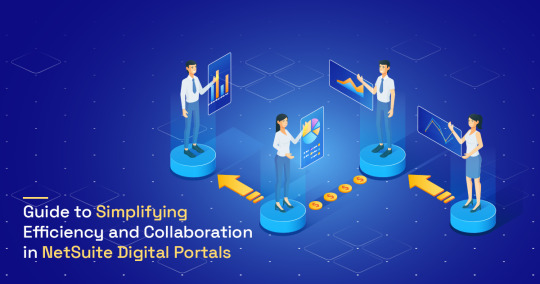
Key features of NetSuite Digital Portals may include:
Self-Service Capabilities: Customers and partners can access their account information, place orders, track shipments, view invoices, and manage other transactions without the need for direct interaction with a representative.
Personalization: Portals can be tailored to each user, providing a customized experience based on their preferences, purchase history, and other relevant data.
E-commerce Functionality: Integration with SuiteCommerce enables businesses to offer online shopping experiences directly through the portal, allowing customers to browse products, make purchases, and manage their shopping carts.
Content Management: Businesses can create and manage various types of content within the portal, such as product information, FAQs, documentation, and support resources.
Collaboration Tools: Portals may include features that facilitate communication and collaboration between customers, partners, and internal stakeholders, such as messaging systems, forums, and knowledge bases.
OpenTeQ is a technology consulting and implementation firm that specializes in NetSuite solutions. They help businesses implement and optimize NetSuite Digital Portals to streamline their operations, enhance customer experiences, and drive growth. Some of the ways OpenTeQ assists with NetSuite Digital Portals include:
Consulting and Requirements Gathering: OpenTeQ works closely with businesses to understand their unique requirements and objectives for implementing a NetSuite Digital Portal. They provide expert guidance on best practices, platform capabilities, and customization options.
Customization and Development: OpenTeQ has expertise in customizing and extending NetSuite's suite of applications to meet specific business needs. They can develop custom features, integrations, and workflows tailored to the requirements of the Digital Portal project.
Integration with Third-Party Systems: OpenTeQ helps businesses integrate their NetSuite Digital Portals with other systems and applications, such as CRM software, marketing automation platforms, and payment gateways, to create seamless end-to-end processes.
Training and Support: OpenTeQ provides training and ongoing support to ensure that businesses can effectively use and maintain their NetSuite Digital Portals. They offer comprehensive training programs for administrators, end-users, and other stakeholders.
Optimization and Continuous Improvement: OpenTeQ works with businesses to continuously optimize their NetSuite Digital Portals based on user feedback, analytics data, and changing business requirements. They help businesses identify areas for improvement and implement enhancements to drive better results over time.
OpenTeQ is a consulting firm that specializes in implementing and customizing NetSuite, which is a cloud-based enterprise resource planning (ERP) software suite offered by Oracle. NetSuite encompasses various business functions such as NetSuite Accounting Software, enterprise planning, customer relationship management (CRM), and e-commerce.
As an implementation partner, OpenTeQ assists businesses in deploying NetSuite to streamline their operations, improve efficiency, and achieve their business objectives. They provide services ranging from initial assessment and planning to customization, integration, training, and ongoing support.
NetSuite is known for its scalability, flexibility, and comprehensive features, making it a popular choice for businesses of all sizes and industries. By leveraging the expertise of firms like OpenTeQ, organizations can optimize their NetSuite implementation to meet their specific needs and drive growth.
OpenTeQ's expertise and experience in NetSuite Integration Platform and customization make them a valuable partner for businesses looking to leverage NetSuite Digital Portals to improve their customer and partner interactions.
#NetSuite Services#NetSuite Solutions Provider#NetSuite Implementation partner#NetSuite ERP Consulting#NetSuite ERP Implementation#NetSuite Consultation#NetSuite Support Services#NetSuite Integration Platform#NetSuite Implementation Consultant#NetSuite Technical Consultant#NetSuite Development#NetSuite Integration Consultants#NetSuite Developer#NetSuite Implementation Company#NetSuite Development Company#NetSuite ERP Support#NetSuite Project Implementation#NetSuite ERP Solution Provider#NetSuite Accounting Software#NetSuite Financial Software#NetSuite SP Partner#NetSuite Solution Provider Partner#NetSuite BPO Partner#NetSuite Customization#NetSuite Data Migration#NetSuite Consulting#Certified NetSuite Partner#NetSuite Accounting Partner#NetSuite CRM#NetSuite Customer Support & Customization
0 notes
Text
The Ultimate Guide to Oracle Fusion HCM | Getting Started With Oracle Fusion HCM
Understanding Oracle Fusion HCM

The software provides robust tools for recruiting and onboarding new hires, evaluating employee performance and setting goals, facilitating skill development through training programs, and supporting succession planning for future leadership roles. Furthermore, Oracle Fusion HCM assists organizations in tracking employee time and attendance, scheduling shifts, managing leave requests and absences, and forecasting workforce requirements based on business needs.
A key advantage of Oracle Fusion HCM is its ability to integrate all these different HR processes and data into a single, cloud-based platform. This ensures that employee information is always current and accessible across departments, eliminating data silos and enhancing efficiency. Oracle Fusion HCM is designed with user-friendliness in mind, offering self-service portals for employees and managers, mobile apps for on-the-go access, and customizable dashboards and reports to support data-driven decision making.
Importance of Oracle Fusion HCM in modern HR management
In today’s fast-paced business environment, effective human resource management is crucial for organizational success. Oracle Fusion HCM plays a vital role in helping companies streamline and optimize their HR operations in several ways.
First and foremost, Oracle Fusion HCM centralizes all employee data and HR processes into a single, unified platform. This eliminates the need for multiple disconnected systems, reducing administrative overhead and ensuring consistent, up-to-date information across departments.
With Oracle Fusion HCM, HR teams can efficiently manage core tasks like maintaining employee records, processing payroll, administering benefits, and ensuring compliance with labor laws and regulations. This frees up valuable time and resources that can be redirected towards more strategic HR initiatives.
Scope of Oracle Fusion HCM
Oracle Fusion Human Capital Management (HCM) offers many job opportunities for different kinds of professionals. Functional consultants help set up and customize different parts of HCM like employee management, talent tracking, payroll, and timekeeping, making sure it fits a company’s needs. Technical consultants handle the technical side of things, like setting up the system, making custom changes, moving data, and fixing problems. Solution architects design how HCM will work in a company, making sure it’s set up well and follows the best practices. Project managers lead the teams working on implementing HCM, making sure everything goes smoothly and meets the company’s goals.
Business analysts study how things are done in a company, figure out what’s needed for HCM, and find ways to improve processes. Change management professionals help people in a company get used to using HCM by making plans and providing training. Support and maintenance roles involve helping out after HCM is up and running, fixing problems, updating the system, and making sure it works well. There are lots of jobs available in Oracle Fusion HCM for people with different backgrounds, like human resources, IT, project management, and business analysis.
Job Profiles in Oracle Fusion HCM
Implementation Consultant: These professionals guide companies through the process of setting up and using Oracle Fusion HCM software. They work closely with clients to understand their needs, configure the system accordingly, test it, and provide training and support to end-users. They need strong technical skills, knowledge of HR processes, and excellent communication abilities.
Functional Consultant: These consultants focus on understanding the capabilities of Oracle Fusion HCM and helping companies optimize their HR processes using the software. They analyze business requirements, design solutions, configure system settings, and provide ongoing support and troubleshooting. They need a deep understanding of HR processes, business knowledge, and the ability to translate business needs into technical solutions.
Technical Consultant: These experts specialize in the technical aspects of Oracle Fusion HCM, such as system integration, customization, and development. They work on tasks like data migration, custom report creation, interface development, and integrating the system with other applications. They require expertise in Oracle Fusion HCM architecture, programming languages, and integration tools.
HR Analyst: These professionals use Oracle Fusion HCM to analyze workforce data, generate reports, and provide insights to support decision-making in the HR department and across the organization. They use their knowledge of HR processes and the software to identify trends, forecast workforce needs, and measure HR metrics like employee turnover, performance, and engagement.
HR Administrator: These individuals are responsible for managing day-to-day operations within the Oracle Fusion HCM system, including user access, data maintenance, system configuration, and troubleshooting. They ensure data accuracy, compliance with HR policies and procedures, and provide support to end-users on system-related issues.
Training Specialist: These professionals develop and deliver training programs to teach end-users how to effectively use Oracle Fusion HCM. They create training materials, conduct workshops and webinars, and provide ongoing support to ensure users are proficient with the system. They need strong communication skills, instructional design expertise, and a deep understanding of Oracle Fusion HCM functionalities.
Project Manager: These professionals oversee Oracle Fusion HCM implementation projects from start to finish, ensuring that projects are delivered on time, within budget, and meet quality standards. They coordinate activities, manage resources, mitigate risks, and communicate with stakeholders to ensure successful project outcomes. They need strong project management skills, leadership abilities, and knowledge of Oracle Fusion HCM implementation methodologies.
Where to Learn Oracle Fusion HCM?
🌟 Elevate Your Career with Triotech Software Trainings! 🌟
Ready to become an Oracle Fusion HCM expert? Look no further than Triotech Software Trainings, your premier destination for Oracle Fusion HCM Online training.
Why Choose Triotech?
🎓 Expert-Led Training: Learn from seasoned professionals with extensive experience in Oracle Fusion HCM, ensuring you receive top-notch instruction every step of the way.
📚 Comprehensive Curriculum: Our carefully crafted courses cover all aspects of Oracle Fusion HCM, from fundamentals to advanced topics, empowering you with the knowledge and skills needed to excel in your career.
💻 Flexible Online Learning: Access our courses from anywhere in the world at your convenience. Whether you’re a beginner or an experienced professional, our flexible learning options cater to all levels of expertise.
🏆 Certification Preparation: Prepare with confidence for Oracle Fusion HCM certifications with our comprehensive training programs and dedicated support from our expert instructors.
🌍 Join Our Community: Connect with like-minded professionals, participate in discussions, and expand your network within our vibrant online learning community.
Contact Us Now
Call Us: +91 8179563510
Mail Us: [email protected]
Visit: www.triotechsoftwaretrainings.com
Our Location
3rd Floor, The Forum Sujana Mall, HIG-3, Near by Nexus, Beside Tea Time, K P H B Phase 9, Kukatpally, Hyderabad, Telangana 500072
0 notes
Text
Dell Boomi Connectors List

Delving Into Dell Boomi Connectors: Your Key to Seamless Integration
Dell Boomi is a robust cloud-based integration platform (iPaaS) that helps businesses streamline data flow between disparate systems. At the heart of its capabilities lies an extensive list of connectors. These pre-built components simplify and accelerate integration processes, enabling you to connect various applications, data sources, and technologies with minimal coding effort.
Understanding Boomi Connectors
What are they? Boomi connectors provide the essential building blocks for communicating with specific applications, protocols, or data formats. They come equipped with the necessary configurations and logic to handle the complexities of interacting with each unique system.
Types of Connectors: Boomi offers a wide variety of connectors, including:
Application Connectors: For popular cloud and on-premises applications like Salesforce, NetSuite, SAP, Workday, Microsoft Dynamics, and many more.
Database Connectors: Connect to databases like SQL Server, Oracle, MySQL, and PostgreSQL.
Technology Connectors: Facilitate interactions with protocols and technologies such as HTTP, FTP, SFTP, SOAP, REST, JMS, EDI, and more.
Custom Connectors: This allows you to create your connectors if pre-built options are unavailable.
Dell Boomi Connector List
To explore the complete connector list, visit the Boomi website. Here, you’ll find a comprehensive list you can filter by category. Some of the most commonly used connectors include:
Salesforce
NetSuite
Workday
SAP
HTTP
Database
SFTP
Web Services (SOAP and REST)
EDIT
Benefits of Using Dell Boomi Connectors
Accelerated Development: Pre-built connectors save significant time and resources compared to building integrations from scratch.
Reduced Complexity: Connectors handle the intricacies of interacting with specific applications, simplifying the integration process for developers.
Enhanced Scalability: Easily add new applications or data sources as your business needs evolve.
Best Practices: Connectors often incorporate industry-standard best practices for integration.
Considerations When Choosing Connectors
Supported Systems: Ensure the connector aligns with the specific version of the application you use.
Authentication Requirements: Check if the connector supports your required authentication methods.
Licensing: Be aware of the licensing implications associated with specific connectors.
Making the Most of Dell Boomi Connectors
Boomi’s extensive connector list is one of its major strengths. By understanding and leveraging these connectors strategically, you can streamline your integrations, improve efficiency, and effortlessly connect your business sys
youtube
You can find more information about Dell Boomi in this Dell Boomi Link
Conclusion:
Unogeeks is the No.1 IT Training Institute for Dell Boomi Training. Anyone Disagree? Please drop in a comment
You can check out our other latest blogs on Dell Boomi here – Dell Boomi Blogs
You can check out our Best In Class Dell Boomi Details here – Dell Boomi Training
Follow & Connect with us:
———————————-
For Training inquiries:
Call/Whatsapp: +91 73960 33555
Mail us at: [email protected]
Our Website ➜ https://unogeeks.com
Follow us:
Instagram: https://www.instagram.com/unogeeks
Facebook: https://www.facebook.com/UnogeeksSoftwareTrainingInstitute
Twitter: https://twitter.com/unogeek
0 notes